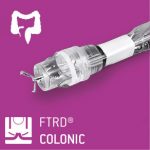A prospective multicenter study analyzing the data of the Dutch colorectal eFTR registry comprising 367 EFTR procedures shows a technical success rate of 83.9 % and a R0 resection rate of 82.4 %. Overall adverse events occurred in 9.3 %.
L.W. Zwager et al., University of Amsterdam, Amsterdam, The Netherlands, presented a prospective observational multicenter study aiming to investigate the technical and clinical success, and safety of EFTR with the FTRD System in complex colorectal lesions in current clinical practice. For the study, the Dutch colorectal eFTR registry was analyzed. The registry comprises nationwide gathered prospective data from all consecutive EFTR procedures in 20 hospitals (5 academic and 15 non-academic).
Between July 2015 and October 2018, a total of 367 EFTR procedures were carried out in 362 patients (63 % men, mean age 69 years). Indications for EFTR were: difficult polyps (non-lifting sign and/or difficult location; n = 133), primary resection of suspected T1 colorectal cancer (n = 71), relapse T1 colorectal cancer (n = 150), and subepithelial tumor (n = 13). Technical success was achieved in 83.9 % of all procedures. In 21 procedures (5.7 %), EFTR could not be performed because the lesion could not be reached or could not be suctioned into the cap. In the remaining 346 procedures, full-thickness resection was achieved in 83.2 % (288/346) and R0-resection was achieved in 82.4 % (285/346). The median diameter of resected specimens was 23 mm.
Overall adverse advents occurred in 34 procedures (9.3 %), 10 patients (2.7 %) required emergency surgery for 2 immediate and 5 delayed perforations (equivalent to an anastomotic leak) and 3 cases of appendicitis (after resection of the basis of the appendix).
The authors concluded that EFTR with the FTRD System is an effective and safe en-bloc resection technique for complex colorectal lesions. The technique has the potential to obviate the need for radical surgery of lesions considered incurable with conventional endoscopic resection techniques.
Endoscopic full-thickness resection (eFTR) of colorectal lesions: results from the Dutch colorectal eFTR registry
Zwager LW, Bastiaansen BAJ, Bronzwaer MES, van der Spek BW, Heine GDN, Haasnoot KJC, van der Sluis H, Perk LE, Boonstra JJ, Rietdijk ST, Wolters HJ, Weusten BLAM, Gilissen LPL, Ten Hove WR, Nagengast WB, Bekkering FC, Schwartz MP, Terhaar Sive Droste JS, Vlug MS, Houben MHMG, Rando Munoz FJ, Seerden TCJ, Beaumont H, de Ridder R, Dekker E, Fockens P; Dutch eFTR Group.
Endoscopy 2020 Jun 4. doi: 10.1055/a-1176-1107
 |
 |


 English
English  Français
Français 